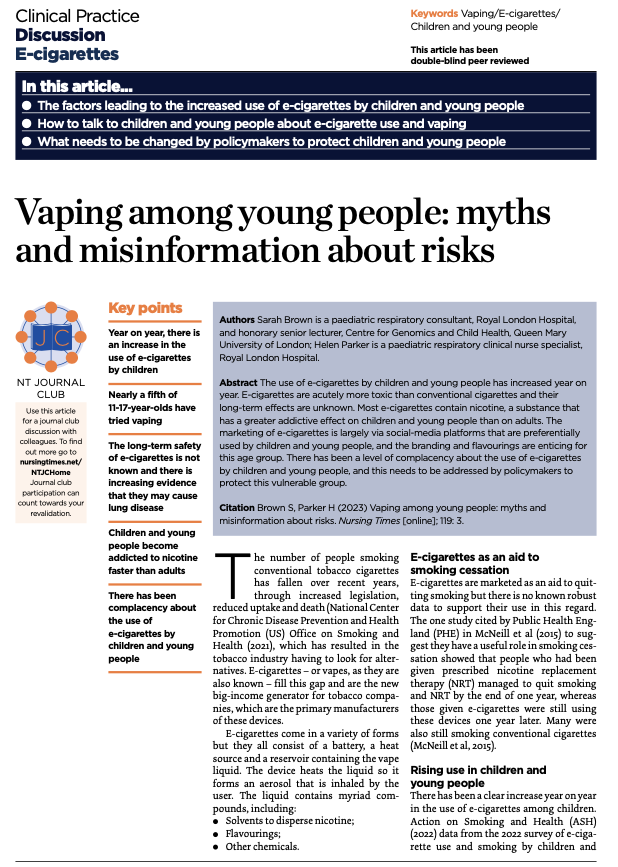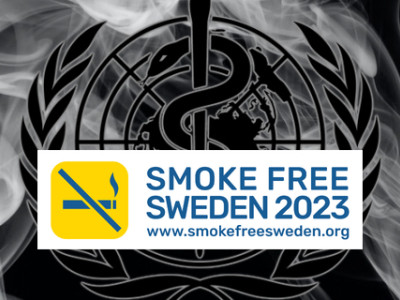The Nursing Times article was submitted by Sarah Brown, a paediatric respiratory consultant, and Helen Parker, a paediatric respiratory clinical nurse. The article is behind a paywall but Planet of the Vapes has been forwarded a copy.
Titled “Vaping among young people: myths and misinformation about risks”, it was heavy on the myths and misinformation angle.
 The article states:
The article states:
- The use of e-cigarettes by children and young people has increased year on year
- E-cigarettes are acutely more toxic than conventional cigarettes
- Most e-cigarettes contain nicotine, a substance that has a greater addictive effect on children and young people than on adults
- The marketing of e-cigarettes is largely via social-media platforms that are preferentially used by children and young people
- The branding and flavourings are enticing for this age group
- There has been a level of complacency about the use of e-cigarettes by children and young people
It is striking how selective the authors have been in their choice of reference material – going so far as to cite a paper by disgraced ex-Professor Stanton Glantz.
Ross, McEwen, and Soar say: “Despite its title, this article gives misinformation, and perpetuates myths, about e-cigarettes (vaping) to healthcare professionals. NT has previously published articles encouraging readers to consider the evidence, and embrace the potential, of safer nicotine-containing products to help their patients quit and reduce the harm from smoking.
“Evidence from respected sources such as the Office for Health Improvement and Disparities (OHID), Action on Smoking and Health (ASH), Royal Society of Physicians, Royal College of Nursing, Cancer Research UK, National Centre for Smoking Cessation and Training and NICE are at odds with the assertions contained within this article.”
The trio of harm reduction experts say the latest and most comprehensive OHID review to date “runs to over 1,000 pages of evidence and analysis”. It provides clear evidence that any claim vaping is more dangerous than smoking is manifest nonsense.
“There is also no evidence that second-hand vapour causes harm.”
The experts also decry any suggestion that the vape industry is synonymous with the tobacco industry, stating “there are many independent manufacturers and suppliers who have nothing to do with the tobacco industry and who are committed to helping adults stop smoking.”
They continue: “The authors claim that vapes are marketed as an aid to stop smoking and that there is no data to support their use. Again, untrue, retailers do not claim this, and it would be illegal to do so. The encouragement comes from Stop Smoking Services and other tobacco control agencies who know from published data and real-life experience that vaping is now the most popular way of stopping smoking. The use of nicotine-containing vapes as an effective stop-smoking aid is also recommended by NICE.”
They continue: “The number of adverse events recorded by the MHRA for e-cigarettes (which in any case is evidence of correlation, not causation), is far fewer (257 since 2016, most minor and transitory) than have been recorded for the most commonly used licensed stop-smoking aid, nicotine replacement therapy (NRT) (297 in 2021 alone).
“There is no evidence that vaping is a gateway to smoking or the use of other substances among young people in the UK. Vaping is displacing smoking, and youth smoking is at its lowest level ever.”
Louise Ross, Dr Andy McEwen, and Dr Kirstie Soar conclude by pointing nurses to the resources produced by The National Centre of Smoking Cessation and Training.
Photo Credit:
Dave Cross
Journalist at POTVDave is a freelance writer; with articles on music, motorbikes, football, pop-science, vaping and tobacco harm reduction in Sounds, Melody Maker, UBG, AWoL, Bike, When Saturday Comes, Vape News Magazine, and syndicated across the Johnston Press group. He was published in an anthology of “Greatest Football Writing”, but still believes this was a mistake. Dave contributes sketches to comedy shows and used to co-host a radio sketch show. He’s worked with numerous vape companies to develop content for their websites.
Join the discussion
Harm Reduction For The Rich
The United Kingdom risks becoming a harm reduction country only for the wealthy, according to Michael Landl of the World Vapers’ Alliance
CAPHRA Highlights Tobacco Control Flaws
The Coalition of Asia Pacific Tobacco Harm Reduction Advocates highlights the flaws in tobacco control which has led to the rise of black market in Australia
A Missed Opportunity at COP10
The Smoke Free Sweden movement says that COP10 was a missed opportunity to save millions of lives
COP10: Promote Tobacco Harm Reduction
Experts with Smoke Free Sweden are emphasising the urgent need for a Tobacco Harm Reduction approach at COP10












